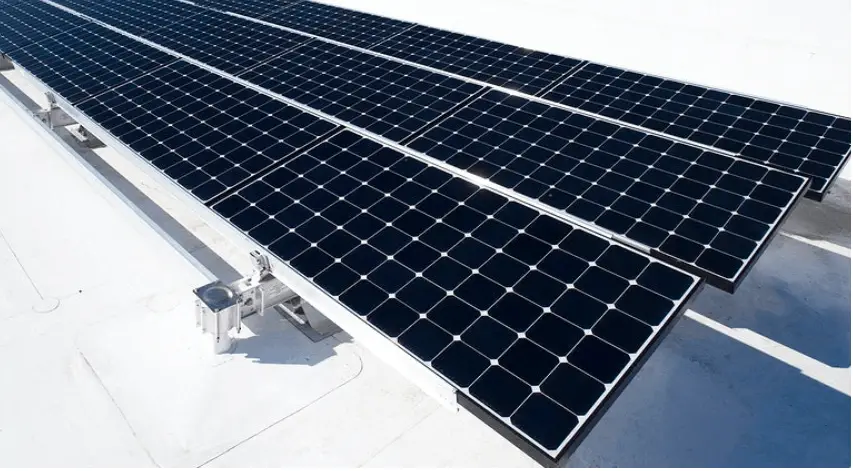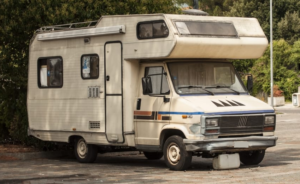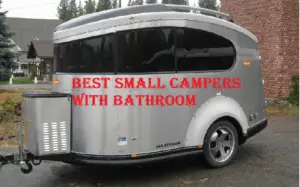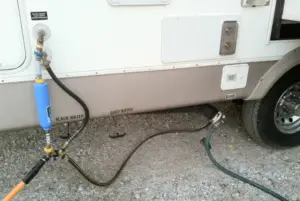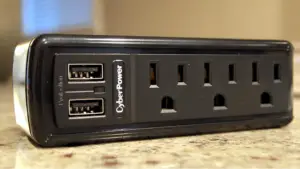Boondocking or dry camping refers to RV camping without hookups. You don’t get water connection, no sewer hose connection and also no electricity. In such a scenario, you are dependent on your battery bank, generator and propane for power or energy requirements.
Another way to meet your power requirements is to use solar panel system. In this article, we will discuss the pros, cons of solar power for RV boondocking. We will see if its a best option and how one can get it installed.
Read : Learn on the basics of solar for RV
Is solar a good option while boondocking in an rv?
Some campsites have electric hookups available for campers who need it as they include it in the cost, or for a fee, you can have electricity when you go camping. But when you go off the grid Aka boondocking, it is an entirely different game.
Having solar panels may be your brightest idea yet when you go boondocking in an RV. When you go boondocking, and there are no electric hookups, you can use solar panels for your extra-source of energy.
Although the RV comes equipped with RV batteries, it needs steady recharging. This is true, especially if you have a lot going on inside your RV, such as having air conditioners, fridge, TV, and other electronic devices or gadgets.
For some, this is a great idea if you have a ready solar panel for when you suddenly need to leave and go someplace unheard of. But for others who rarely go to any remote places that do not have electric hookups, it may be an added expense that they can go without.
How many solar panels watts would you need?
Factors such as electronic equipment you have in your RV and other devices will also gauge how much you will need.
Low to Medium power consumers include laptop computers, fans, microwaves, toasters, light, water pumps, coffee makers, hair dryers.
While air conditioners, space and water heaters, heat pumps are all high-power consumers.
The number of solar panels and watts you will need will depend on your electronics usage in your RV meaning if you have the usual coffee maker, hair blower, a microwave perhaps, and a TV the estimated wattage you will need is between 400 to 600 watts of solar panels.
If you need to have some heavy electronic usage, such as a fridge plus other essential electronic devices and equipment, the watts you will need are between 3,000 to 4,000 watts.
But if you just have basic electronics in your RV, such as laptops, light, and a TV, you will need between 200-300 watts of solar panels.
So if a 100-watt solar panel can produce 30 amp-hours daily, this can determine how many solar panels you will need in your RV.
What can you run
Common appliances such as a light bulb, microwave, mini-fridge, and TV can run with solar on the RV. If you are an RV user that depends more on numerous electric appliances you may need to have a higher watt or additional solar panels installed.
Some can get by with minimal electric consumption, these people can use simple Led lightings, they charge their electronic devices, a heater perhaps, also water pump, and one to two hours of TV usage.
The other consumers can use additional electronics such as a crock-pot, small fridge, toaster, and use the TV for four to five hours.
And then some RVers cannot get by without multiple TVs, a coffee maker that is usually on for hours, a large fridge, also a large microwave oven and an AC. They usually require high watts that can go beyond 600 watts.
There will be two types of appliances or items inside your RV. One that will run on AC power and the other on DC battery power. Also, you will have some things that can run on propane as well.
Propane is a great option for boondocking. Refrigerator, furnace, stove can run on propane. Refrigerator can also work on DC battery or generator AC power.
With solar you will be basically storing the power in battery which can be directly used or you can convert it to AC via an inverter.
We run our 48 inch TV on inverter for around 2-3 hours daily on solar. Plus we also charge mobiles, laptops using the pure sine wave inverter. We also run other appliances that run intermittently for very short period of time like crock pot, egg boiler.
We do not run bigger high consumption appliances on inverter like the hair dryer, microwave or toaster. These appliances have higher watts consumption and also run for little longer. AC again is high watts consumption appliance.
For these we utilize our portabel generator. Thats the best option.
The solar charged DC battery powers various components in our RV. The LED lights, multiple fans in bedroom, kitchen, bathroom are powered by battery. The DC battery also provides power for carbon monoxide detector, furnace, refrigerator, stereo and few other items.
To summarize, solar is good enough to run most of the appliances in RV except for air conditioner, Refrigerator, microwave, hair dryer and other high watts long running appliances.
Can you run Air conditioner
Air conditioners in RV run on generator or the campground electricity connection. Its not practical to run them on battery. Therefore most RVers will have generator to run the AC when boondocking.
A inverter will convert the DC power from battery to run some of the appliances but its not really for the bigger appliances like air conditioner which need more watts.
Also Read :
Average watts consumption by RV Air conditioner
How Many watts do RV furnace consumes
Average watts requirements of RV
To run a 13,500 BTU air conditioner you will need at least 2000 watts for starting and 1500 watts for running. To produce that many watts you will need bigger inverter probably more than 2500 watts. Usually, the inverter that you get for RV range between 1000 to 2000 watts.
So, to answer the question, yes it is possible to run the Air conditioner on battery power but not an ideal or practical way.
What about lithium batteries and a solar combination
Lithium batteries can be used much longer and without affecting their long term operations. But, even with such batteries you are looking at a lot of batteries. For example, say you want to run the air conditioner for around 6-8 hours, you would need 6-8 batteries delivering 100 AH.
And with these many batteries the weight will also be high. Each of these 100 AH batteries will weigh a minimum of 50 pounds and with 6-8 batteries it will be close to 250 pounds. That’s with the weight.
Cost again is going to shoot with those many batteries. One word. Not practical.
Get a generator that is good enough to power your 13500 BTU or even 15000 BTU air conditioner.
Setting-up your rv solar panels
You can either have a professional do the installation of the solar panels for you or if you are more of a DIY person and can tinker easily with the tools you have, you can set up the solar panels yourself.
Before you buy your solar panels, consider how many watts you will need, and from there, you will know how many solar panels you should purchase.
Since there are also sellers of solar panel kits willing to help with their buyers, it would be best to ask for advice and tips from these sellers.
Before you go home and bring your solar panels with you read the instruction that comes with the solar panel kit so you will understand the step-by-step process of installation.
Check what they include in your solar kits as the screws, brackets, and solar cable connectors for your panels should be there. Adhesives are also a must, ask the seller if they have any available.
Important steps in installing
You need to measure your roof, then the panels, but first, conclude the panel layout that you prefer. You need not waste time on bringing everything up on the roof while you don’t have the measurement in place yet.
Make sure you are placing the solar panels away from A/c units, TV antennas, or coverings of the vent fan. You need to keep in mind about shades and shadows, which can hamper your solar panel from absorbing solar energy.
Measure the solar cable as it should not be over twenty-five feet from the solar panel directly to the battery bank, ensuring that you don’t have a cable that is too long will prevent loss of charging power.
The gauge should not be smaller than ten gauges, choosing a larger, and thicker wire may benefit you more since there is a better power transference.
Do not forget to purchase an amp breaker as well. You can either wire your solar panels in parallel or series. Installers may also assist you on this one as they know more about the benefits of having the solar panels in parallel or series.
Make sure that your solar panel installation is watertight around the edges.
Solar controller or remote for your inverter will make things a lot easier for you when you need to monitor battery charging. Remotes should also be accessible.
Where to install them
You can either have it installed on your RV roof or just buy a portable and easy to place on the ground solar panel.
Having your solar panels on your RV roof can be helpful and disadvantageous at the same time. Beneficial because you don’t need to keep on placing it on the ground just to absorb the sun’s rays as it is just sitting there on your roof doing its thing.
We have our solar panels installed on the roof. The reason why we did that is because:
- You don’t have to pack and unpack the panels every time you are set for the camping. The panels rest there at the top and provide the power needed.
- The exposure to sun is maximum at the top of the roof. Sun is all you need for your panels so that works great.
- Your panels are safe. Less likely to be stolen wen they are there at that height.
- It isn’t taking your storage space. Roof otherwise would have been empty and underutilized anyways.
- Not much efforts when you have them on the roof. We do have brackets installed for titling them wherever needed though. Its not much of effort though. We did our own brackets instead of going for solar kits. It saved money for us. You can either build your own or for solar kits that are much easy to install. The cost would be higher though.
The negative aspect of having your solar panel on the roof is you tend to forget to clean them, and hence it makes the solar panel less effective.
Another drawback is that it needs space on your roof, and with that, if you need to take a peek atop your roof, make sure that you don’t step on the solar panels.
Solar panels that you can place on the ground are manageable, and you can tilt them to face the sun at an angle. With it being portable, you can also clean it more often.
However, since it is a portable solar panel, you need to set it up all the time and find a fitting spot to place it on.
It is ideal also for those RVers with only a small electricity consumption, with powerful winds portable solar panel can topple over or can also be run over by other vehicles in cases of untoward incidents.
A great idea to deal with where to place them is actually to employ both. Yes, get the basic setup done on the roof and have folding panels that can setup on the ground whenever the need arises to boost the power.
Basic Working
The solar panels absorb the sun’s rays, transform the energy from the sun to create electricity, and recharges your RV battery. Learn here on how the solar charges the DC battery in your RV.
The weather is not always ideal, so a sunny camping spot can do the trick, and your solar panel’s clear line directly to the sun is a must.
The battery bank in your RV saves the electricity that is being formed by your solar panels. The Power inverter then converts the power from the direct current, which is from the batteries to be used to power RV electronic appliances and devices.
With the charging of your RV batteries, there is also a danger of overcharging, so an automated switch must be installed to control the flow of solar energy into your RV’s battery. This is a must to maintain safety in your RV.
Issues you may face
Some RV users find it expensive to buy and also not a breeze to install. Although there are professional installers available, they are not keen on paying more to have it installed after paying thousands to purchase solar panels.
Also, issues with buying the components separately for those who are just saving up enough money to complete their solar panel set, there is the issue of incompatible components, so it can also bring in some additional stress for the RV users.
Other RVers don’t have the patience to learn about the ins and outs of having solar panels. Thinking of how many panels to install, checking their electronic usage, and managing the overall solar panel system is taxing for others.
Worrying about not getting enough electricity from the solar panel is another thing, if they veered too far where there are not enough sun rays or there are shades where they parked, or the weather is not just ideal is another concern for RV users.
Repair and Maintenance is another issue for RV owners. On top of having to maintain their RV and spend money on repairs, there is also the issue of solar panels bogging down and can be daunting for others to even think of.
There are also solar panels getting stolen, such as the portable solar panels that you place on the floor, this is another consideration of RV users that makes them think twice about getting their RV installed with a solar panel.
Its important to have efficient panels because the more panels you get more will be the area occupied on the roof. Your roof may not be able to accommodate many panels. So, get the ones that are compact and efficient, that is what we have done too.
Monocrystalline panels are more efficient as compared to polycrystalline panels. Check all the advantages and disadvantages for Monocrystalline and polycrystalline.
Best Solar Panels you can buy
Before we look into which are your best options in this space lets check out some of the important things to look for.
Efficiency : This is the main aspect that you should focus on. High efficiency is important because otherwise you will end up having those panels that will belying there and just taking up the space.
Weight : Be sure you aren’t buying those bulky ones out there. Weight is critical when you talk about anything related to RVs.
Design : When buying a solar kit be sure to have a design that will facilitate the ease of use and yet give you option like tilting, folding and less weight. Its should reliable and easy to setup or install.
Cost : Installing solar can be high on cost. Its going to be free after you install though. But, to get quality panel kit you may have to spend a little higher specially if you want better design and features. Look for value for money rather than saving on money. Its going to be free for life after you install. If you are full timing with RV then you need to consider this fact into consideration.
Brand/Quality : Obviously this has to be taken into account. Solar is a emerging thing and you don’t want to spend your money on something that will stop working or become less efficient with time.
1. Renogy Solar Power Starter Kit
This includes monoscrytaline 100 watts 12 Volts panels. This is a highly rated solar kit that is used many RVers. It weighs around 16 pounds. It provides an ideal output of around 500 wh per day and fully charge a 50Ah battery in around 3 hours (from 50%).
The panels can last very long due to the aluminum frame that is corrosion free. Making the panels great for outdoor use. These are great for RVers who are just starting due to the easy installation.
The full package include all the necessary tools. It include a 100 W 12 Volt monocrystaline panel, renogy wanderer 30A PWM charge controller, mounting Z brackets, adapter kit and tray cable.
2. Renogy Monocrystalline
This panel is multi layered that provide improved performance and also last very long. They have corrosion resistant aluminum frame which facilitates better durability. Other features include better transparency and low iron tempered glass.
Their weight is also on lower side. They weigh around 16.5 lbs. The bundle kit include 100 w 12 V monocrytaline panel, adapter kit, charge controller and extension cable. Its a value for money product and great for new RV owner for boondocking.
3. WindyNation Complete
This include a polycrstaline panels weighing around 19 pounds. Other components in the package are 30 Amp controller with battery temperature sensor, connectors, solar mounting hardware and the manual.
It provides clean renewal solar power and the panels are quality built/ This too is great if you are just starting with solar for your RV.
Its a perfect solar kit to get back up power in your camper.
In Conclusion:
Solar for Boondocking or even for RV in general is a great option to go to. Its a clean and free energy. Overall the advancements have made it easy to install and use. The efficiency is also much better and you can certainly rely on it.

